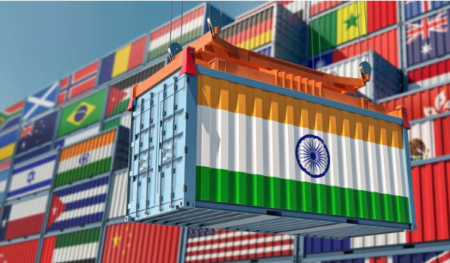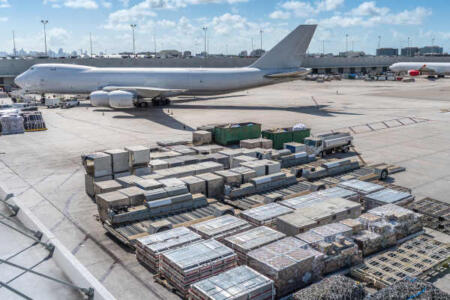In the forthcoming discourse, we delve into the intricate dynamics of data-driven logistics and consumer privacy. We scrutinize how modern supply chains leverage data for efficiency while also addressing the burgeoning concerns regarding consumer privacy in an increasingly interconnected world.

The modern supply chain is a marvel of efficiency. Goods seamlessly traverse continents, arriving at our doorsteps with astonishing speed and precision. This logistical ballet relies heavily on data—a symphony of information on everything from container temperature to consumer preferences. However, this data-driven efficiency raises a critical question: Is the pursuit of a frictionless supply chain putting consumer privacy at risk?
The power of logistics data
The logistics industry generates a staggering amount of data. Every shipment—its origin, destination, contents, temperature, and even estimated time of arrival—is meticulously tracked. This data goldmine fuels a range of optimizations, including:
- Route optimization: Companies leverage real-time traffic data, weather patterns, and fuel costs to plot the most efficient routes, potentially saving billions annually.
- Predictive demand forecasting: By analysing past sales data and consumer trends, companies can forecast demand and pre-stock warehouses, avoiding stockouts and optimising inventory levels.
- Enhanced Security: Real-time tracking allows companies to pinpoint the location of goods at any given time, deterring theft and facilitating faster recovery in case of incidents.
Table 1: The Benefits of Data-Driven Supply Chain Management
| Benefit | Impact | Source |
| Route Optimization | 20-30% reduction in delivery times, 10-15% decrease in fuel consumption | McKinsey & Company (2020) |
| Predictive Demand Forecasting | 10-20% inventory reduction | Harvard Business Review (2014) |
| Enhanced Security | Up to 50% reduction in cargo theft | Supply Chain Management Review (2017) |
The privacy paradox
While data fuels efficiency, it can also be a double-edged sword. Here’s where the privacy concerns arise:
- Personalization creep: Consumer data gleaned from online purchases and delivery addresses is increasingly used for targeted advertising and personalised recommendations. This level of intrusion can be unsettling for many consumers. A 2019 Pew Research Center report, “Americans and Privacy: Concerned, Confused, and Wanting More Control,” found that 72% of Americans are concerned about how data is collected and used by companies.
- Data security risks: Cyberattacks targeting logistics companies pose a significant threat. Breaches can expose sensitive consumer information like addresses, purchase histories, and even financial details. The Cybersecurity and Infrastructure Security Agency (CISA) reported a 300% increase in cyberattacks on the transportation and logistics sectors in 2021.
- Global data sharing challenges: The global nature of supply chains raises complex data privacy challenges. Data collected in one country with lax regulations could be accessible to entities in another with stricter privacy laws, creating compliance nightmares. The International Chamber of Commerce’s 2020 report, “Data Governance in the Age of Artificial Intelligence,” emphasises the need for international collaboration to establish clear data governance frameworks.
Finding the balance
The quest for an optimised supply chain needn’t come at the expense of consumer privacy. Striking the right balance requires a two-pronged approach:
- Regulation and transparency: Implementing clear data privacy regulations with robust enforcement mechanisms is critical. Consumers have the right to know what data is collected, how it’s used, and with whom it’s shared. The European Union’s General Data Protection Regulation (GDPR) serves as a potential model for other nations.
- Technological innovation: Technological solutions like anonymization and pseudonymization can help protect sensitive data while allowing companies to continue gleaning valuable insights. Additionally, blockchain technology offers a secure and transparent way to track goods without compromising individual privacy. The World Economic Forum’s 2020 report, “The Case for Blockchain in Supply Chain Finance,” highlights the potential of blockchain to enhance supply chain transparency while ensuring data security.
The road ahead: A collaborative approach
The tension between data utilisation and privacy is a complex issue with no easy answers. However, by fostering open dialogue between industry leaders, regulators, and consumer advocacy groups, we can develop an ethical framework for data management that optimises logistics without compromising privacy rights.
Here are some key considerations for navigating this complex landscape:
- Industry standards and best practices: The collaborative development of industry-wide data privacy standards and best practices can ensure consistency and facilitate compliance across the supply chain ecosystem. This could involve establishing clear guidelines for data collection, storage, and usage, along with robust data security protocols.
- Consumer education and empowerment: educating consumers about their data privacy rights and empowering them with tools to manage their data is critical. This could include providing clear information about how their data is used, offering opt-in/opt-out options for data collection, and simplifying data access and deletion procedures.
- Technological innovation for privacy-preserving analytics: Continued development of privacy-preserving analytics techniques can allow companies to extract valuable insights from data without compromising individual privacy. This could involve advancements in anonymization techniques, differential privacy, and secure multi-party computation.
- Global collaboration on data governance: As supply chains become increasingly globalised, international cooperation on data governance frameworks is essential. This could involve harmonising data privacy regulations across different jurisdictions, fostering cross-border data exchange agreements that respect privacy rights, and establishing international enforcement mechanisms.
The future of supply chain transparency and privacy
The future of the supply chain hinges on finding this delicate balance. Here’s what a successful future might look like:
- Enhanced transparency and efficiency: Consumers can access information about the origin, journey, and ethical sourcing of products without compromising their own privacy. This fosters trust and brand loyalty.
- Data-driven sustainability: Logistics companies can leverage anonymized data to optimise resource utilisation, reduce carbon emissions, and promote environmentally friendly practices throughout the supply chain.
- Empowered consumers: Consumers have control over their data and can make informed choices about how businesses use it. This fosters a more ethical and responsible data ecosystem.
By embracing a collaborative approach that prioritizes both efficiency and privacy, the logistics industry can ensure a future where seamless global trade coexists with strong consumer data protection.











